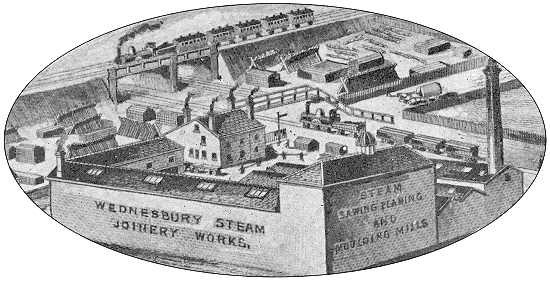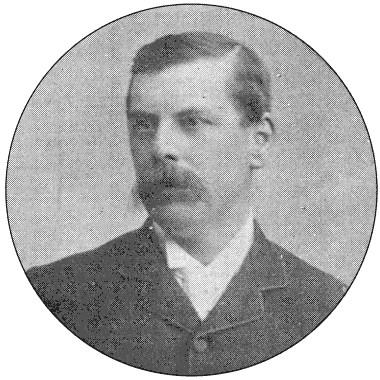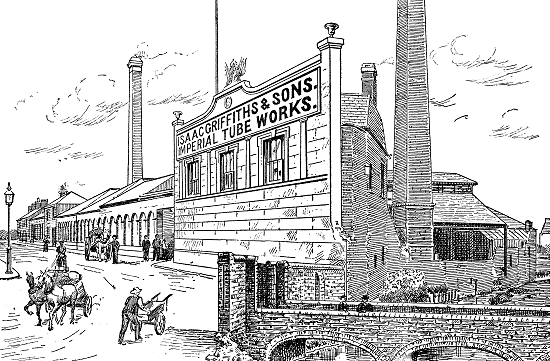| The employment of female labour generally tends to
economy in the wages-sheet. Pit bank girls earn from 1s. 3d.
to 1s. 9d. a day (or "shift") which consists of eight
working hours. They are generally employed for sorting and
loading the coal. When the tubs or skips come up the pit, a
man receives them first, and they are then handed over to
the women. |
 |
|
They sometimes take them along
tram rails to load carts or boats, or who screen the
coals, or pick them by hand in the process of
sorting to determine the various qualities.
As a
class, pit bank wenches are neither immodest nor
immoral; but as may be expected, they are somewhat
masculine in tone and brawny in physique. They wear
no distinctive working costume in and around
Wednesbury, although at Wigan they wear trousers
like men. In Staffordshire a cotton bonnet is used
to keep the coal dust from the hair, a little shawl
to protect the shoulders; the skirts are short, and
covered with a coarse apron tied tightly round the
bottom to keep the petticoats from blowing up. A
pair of strong hobnailed boots complete the attire.
|
| Isaiah Oldbury, Reliance Coach
Ironworks, Wednesbury |
|

The Smithy. |
The Reliance Coach Ironworks,
owned by the present Mayor, Mr. Isaiah Oldbury
occupy a high and influential position in this
important branch of manufacturing activity. It is
about twenty three years since the present works
were started, and thirty three years since the
business was founded by Mr. Oldbury. |
| Its very successful career from the inception to the
present time abundantly testifies to the energy and ability
brought to bear upon its management.
The works have been enlarged from time to time to meet
the increased demands, and only recently a malleable iron
foundry has been added. |

Axle and turning shop. |
| They now cover a
considerable area of ground, giving constant
employment to between one hundred and fifty and two
hundred hands, and being equipped with all the
requisite steam power machinery and labour-saving
appliances to facilitate rapid and economical
production. The chief manufactures include coach
bolts and nuts, steps, scrolls, dash irons, clips,
shackles, and coach ironwork in general; also mail, Collinges, drabbles, and other axles, and springs. For all these productions Mr. Oldbury enjoys a high
reputation both at home and abroad, hence his large
and steadily increasing connections; and it may be
stated that he is a well-known contractor to Her
Majesty's Government, the War Office, and Admiralty;
also to Sir W. G. Armstrong, Mitchell and Co.,
Limited, and Sir Joseph Whitworth and Co., Limited.
None but the most durable and best finished goods
leave the premises, whilst the productive facilities
are such as to ensure the speedy execution of all
orders.
|
| C. Walsh Graham, Timber
and Slate Merchant |
|
Steam Joinery Works, Sawing,
Planing, and Moulding Mills, Wednesbury.
(Adjoining
the L. & N. W. Station).
|
 |
 |
This business was established upwards of twenty five
years ago on the land now occupied by the Art Gallery.
Before long the growth of the business necessitated a move
to the present extensive and convenient premises in Potter's
Lane, where a very large and important trade is carried on. |
|
A large stock of all kinds of English and
Foreign timber is kept. The manufacture of joinery
of every description, by well adapted machinery, is
a speciality.
The slate trade is also an important
department, Mr. Graham being agent for Lord Penrhyn, and the owners of
other noted Carnarvon quarries.
Estimates are given,
on application, for the whole of the timber,
joinery, slates, &c., required for buildings.
There
are prosperous branches in connection with the
business at Wolverhampton and Soho, and Mr. Graham
is also senior partner in the firm of Graham and
Bennett, Derby. |

Mr. C. Walsh Graham. |
| Foster Bros., Limited, Lea
Brook Tube Works, Wednesbury. |
|
Manufacturers of Tubes and
Fittings, for gas, steam, and water purposes, plain,
galvanised, enamelled, tin-lined, or coated with Dr.
Angus Smith's or other solutions.
Telegraph and telephone poles,
hydraulic tubes, wire and cable tubes, railway
signal and point rods, well boring tubes, core bars,
coils, for hot water, steam, and refrigeration
purposes; lap welded iron and steel
boiler tubes, gun metal cocks and valves, etc.
London Office and depot: Lambeth Hill, Queen Victoria
Street, E.C.
Representative:
Mr. R. W.
McDonald.
|
 |
 |
Manufacturers of patent welded
wrought iron tubes and fittings for gas, steam, and
water.
Galvanised iron tubes and
fittings. Hydraulic tubes, stocks, dies &
taps. Pipe hooks, and core bars for ironfounders.
Coils of all descriptions, etc.
Imperial Tube Works, Mesty
Croft, Wednesbury.
|
| This well known business was
founded by the late Mr. Isaac Griffiths, who was in
the service of the Russell family before the
invention of gas tubes, and was connected with them
altogether for more than forty years. Latterly he
was general manager for Messrs. John Russell and
Co., a position which he resigned in 1860 to
commence business in partnership with his brother,
Mr. John Griffiths, and Mr. Thomas Billingsley,
under the style and title of Griffiths and
Billingsley.
After about ten years' partnership, Mr.
Isaac Griffiths left this firm, and purchasing the
site of the tube works formerly conducted by Hughes,
Pritchard and Hughes, in Friar Street, he erected
thereon an entirely new factory, which, known as the
Imperial Tube Works, has been carried on ever since
under the style and title of Isaac Griffiths and
Sons. Mr. Isaac Griffiths, the senior partner, died
in 1874 and the business is now carried on by his
sons, Messrs, Isaac and W. H. Griffiths. All the
usual branches of the tube and fitting trade are
followed, and core bars for ironfounders are made,
with various other specialities. The establishment
is thoroughly well equipped in all respects.
|
| Job Edwards, manufacturer of
Patent Welded Wrought Iron Tubes for gas, steam, and
water. |
|
Wrought and malleable iron
fittings of every description.
Stocks, dies and taps.
Stampings of all kinds.
Eagle Tube & Junction Works,
Wednesbury.
|
 |
| Of the two manufactories
carried on by Mr. Job Edwards at the present time,
the Junction Works in Potter's Lane was the first
established. This was in 1863. Gas fittings and
general smiths' work constituted the staple trade,
and a large and valuable business connection was
speedily acquired, and has kept on growing from that
day to this.
In the early history of the works an
extensive trade was done in colliery plant and
ornamental iron work, and when the forerunner of the
present day bicycle, the "bone shaker," enjoyed a
fleeting popularity, Mr. Edwards laid himself out
for the manufacture of this machine, and was amongst
the largest makers. Its successor, the "spider
wheel" bicycle, found Mr. Edwards still convinced of
the possibility of profit being reaped from this
branch of trade, and many thousands of sets of
stampings and fittings were made at the Junction
Works. Had the same policy been pursued when the
"spider wheel" gave place to the "safety" Wednesbury
trade would no doubt have benefited to a very
considerable extent.
In 1880, Mr. Edwards erected
the Eagle Tube Works in Portway Road where a steady
and growing trade in tubes and fittings for gas,
steam, and water has since been carried on. Quite
recently it has been found necessary to enlarge
these works. Between one and two hundred men and
boys find regular employ under Mr. Edwards, whose
name is well known wherever tubes are bought, and
whose reputation ranks very high in the trade.
|
| Henry Hollingsworth,
Wholesale and Retail, Holyhead Road, Wednesbury |
 |
Beef & pork butcher
Wednesbury has not a single business
house which is better known amongst the inhabitants or which
enjoys a more widespread reputation outside the town than
that of Hollingsworth’s.
Established in the year 1857 by the
late Mr. Henry Hollingsworth, in whose name it is still
conducted. |
| The business has proved singularly successful, and a
continuance of prosperity is assured as long as it remains
in the able hands of the four sons of the founder, who are
now the guiding hands of the concern. In 1879 the late Mr.
Henry Hollingsworth met the demands of a rapidly
growing trade by the erection of the large,
handsome, and convenient block of buildings which
stands at the corner of Holyhead Road and St. James'
Street, and which is such a familiar object to all
who know anything about the town. The premises are
extensive and well arranged. The capacious shop, the
window of which displays to the public a tempting
array of pork pies, sausages, joints etc., provides
accommodation for a crowd of customers. The pigs,
which are slaughtered for the benefit of these
customers, are dealt with by skilled butchers,
curers, and so forth, in places which are admirably
adapted for the various purposes. In addition to a
large slaughter house, clean and wholesome, there is
a curing room, fitted with a first class
refrigerating apparatus, and in which hundred of
legs and sides in various stages of conversion into
hams and bacon may always be seen; a sausage house,
lard rooms, ham rooms, bacon room, and a drying room
capable of dealing with 500 hams and sides at one
time. There are also, of course, the usual fasting
pens, and a spacious yard. The machinery, which is
all modern, is driven by steam.
The extent of the
firm's operations may be judged from the fact that
in the season upwards of 200 pigs are killed every
week, and last Christmas the number rose to over
300. The meat and other articles of food thus
produced are not all consumed in Wednesbury. In
addition to numerous agents throughout the Black
Country district, supplies are daily forwarded to
the order of firms in all parts of the country from
Carlisle in the North to London in the South. More
than 20,000 hams, for instance, all cured on the
premises, are sold every year to dealers at a
distance. Hollingsworth’s sausages and pork pies are
also well known and appreciated by people who only
know Wednesbury as the source of these favourite
productions.
During the past year electric light has
been installed at the establishment, adding greatly
to the attractiveness as well as to the utility of
these thoroughly up-to-date premises. We should say
that whilst retaining pork as the staple article of
trade, the firm are now butchers in the ordinary
acceptation of the term, and beef and mutton of the
best quality can always be obtained.
|
| Alfred Longbottom, Practical
Tailor, Old Assembly Rooms, Russell Street,
Wednesbury. |
|
Mr. Longbottom has only been
three years in Wednesbury, coming hither from
Stourbridge, but thanks to the display of a vast
amount of energy and a good deal of well-directed
enterprise, he finds himself today at the head of one
of the biggest businesses in the town. |
 |
| Mr. Longbottom’s first stand in the town was at the
bottom of Spring Head, but he very rapidly outgrew
the capabilities of this particular shop, and
removed to the premises in Lower High Street
formerly used for the same kind of business by Mr. John Bryne.
Judicious advertising and personal effort brought
customers in rapidly increasing numbers from all
parts of the town and district, and as Mr. Longbottom only uses reliable stuff, guarantees a
good fit, and charges reasonably, a customer once
gained, means a customer retained. Another move, the
third in three years, has just been made. The
premises in Russell Street, known as the "Assembly
Rooms" and as the "Old Town Hall," have been secured
by Mr. Longbottom, and have been adapted to the
purposes of his trade.
The rooms, in which in the old
days magistrates administered justice, and all public
gatherings took place, which served as the
Mechanics' Institute, and later as the headquarters
of the Young Men's Christian Association, and which
have been utilised for a young ladies' school, a
dancing saloon, and a variety of other purposes,
will now resound to the hum of the sewing machine
and the rattle of the machinery, which at the end of
the nineteenth century has come to the aid of the
busy tailor.
The workroom measures 60 feet by 30
feet, and the stock and cutting room is 40 feet long
by 30 feet wide. They are light, airy, and well
ventilated, Mr. Longbottom having taken care to
ensure the comfort and the convenience of the large
number of men and girls whom he employs. Ladies' and
gentlemen's garments of all kinds are made on the
premises, and in such large numbers as to have a
beneficial effect on the town from an industrial
point of view.
|
|
The Quaker's Furnaces, in the
Darlaston Road, were put out of blast and demolished
in 1877, they were out of date, and iron-making was
becoming profitless. The stack was left standing for
nine years.
This Furnace Stack was
"dropped" in June, 1896. A corner was first cut away
(to give it an inclination in falling), and then
three charges of blasting powder were simultaneously
exploded, and the 110 feet of chimney came down with
as little commotion as possible. |
 |
|
 |
|
 |
|
Return to
Industries part 1 |
|
Return to
the contents |
|
Proceed to
Adverts |
|